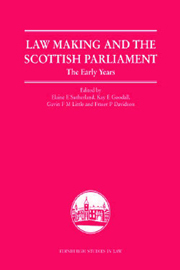Book contents
- Frontmatter
- Contents
- Preface
- List of Contributors
- Table of Cases
- Table of Westminster Statutes
- Table of Scottish Parliament Statutes
- Table of Westminster Statutory Instruments
- Table of Scottish Statutory Instruments
- THE SCOTTISH PARLIAMENT – ITS GENESIS AND OPERATION
- RIGHTS AND SOCIETY
- PUBLIC ADMINISTRATION AND SERVICES
- 7 Local Government
- 8 Housing
- 9 Education: Could Do Better
- JUSTICE AND LEGAL SYSTEM
- ECONOMY AND ENVIRONMENT
- Index
7 - Local Government
from PUBLIC ADMINISTRATION AND SERVICES
Published online by Cambridge University Press: 05 September 2013
- Frontmatter
- Contents
- Preface
- List of Contributors
- Table of Cases
- Table of Westminster Statutes
- Table of Scottish Parliament Statutes
- Table of Westminster Statutory Instruments
- Table of Scottish Statutory Instruments
- THE SCOTTISH PARLIAMENT – ITS GENESIS AND OPERATION
- RIGHTS AND SOCIETY
- PUBLIC ADMINISTRATION AND SERVICES
- 7 Local Government
- 8 Housing
- 9 Education: Could Do Better
- JUSTICE AND LEGAL SYSTEM
- ECONOMY AND ENVIRONMENT
- Index
Summary
INTRODUCTION
Local government has been described as “big business”. With the exception of northern Ireland, local authorities in the united Kingdom are responsible for education, housing, personal services, transport, planning, fire and rescue services, policing, libraries and museums, leisure and recreation, waste services, consumer protection and environmental health. this chapter examines the role which has been played by the Scottish Parliament in the development of local government.
Local government falls within the legislative competence of the Scottish Parliament. Further, local authorities are creatures of statute, with legislation defining their geographical areas, the way in which their members are elected, how their business must be conducted, the services they can or must provide, the powers they may exercise, many of the duties they must fulfil and how they may be controlled by central government and the courts. the key features of local authorities are summarised by Hart who states that they are legally independent entities, which are popularly elected, have independent powers of taxation and are to a certain degree autonomous. He then underscores the significance of local government by stating that local authorities are neither legally nor politically mere agents of central government. It is, therefore, interesting to consider how the Scottish Parliament, which itself is a creature of the Scotland Act 1998, has used its legislative powers in relation to local authorities.
- Type
- Chapter
- Information
- Law Making and the Scottish ParliamentThe Early Years, pp. 127 - 140Publisher: Edinburgh University PressPrint publication year: 2011



